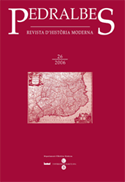La figura episcopal i pública de Josep Climent a Barcelona (1766-1775)
Keywords:
Josep Climent, episcopal, Jansenism, Enlightenment.Abstract
Monseñor Josep Climent Avent (1706-1781) was a man with a multifaceted personality. This study focuses on several aspects of his life as Barcelona’s pontificate (1766-1775). I) Pastoral work, of Tridentine and reformist inspiration: efforts to renovate sacred oratory and to purify worship of its folkloric elements; a service befitting of the “Enlightened” Spaniards of the 18th century. II) Activities in Barcelona’s day-to-day life: the creation of free schools for poor boys and girls; the placement of cemeteries outside city walls; social engagement and charity. III) Intellectual and cultural role: his fight against the Probabilism theory of the Jesuits, his support for the Jansenistic Church of Utrecht; his promotion of Thomism, biblical, philosophical and historical studies in addition to studies of the Spanish and Catalan languages, as well as his opposition to the rational thought of 18th century Enlightenment. IV) His resignation from the diocese of Barcelona given his opposition to Carlos III’s royal prerogative. V) His thought: marked by two basic tenants; Jansenistic (with its episcopal component - precisely because of its episcopalism distancing him further from royal prerogative practices of other Spanish pro Jansenistic bishops – and his moral rigor) and “Enlightenment”. In conclusion, Josep Climent can be considered a pro Jansenistic, pre-enlightenment, reformist bishop during the Enlightenment. He was also the Spanish pro Jansenistic bishop with most European projection.
Downloads
Published
How to Cite
Issue
Section
License
Copyright (c) 2006 Ramon Corts i Blay

This work is licensed under a Creative Commons Attribution-ShareAlike 4.0 International License.
Authors must agree with the following terms:
1. The author keeps authorship rights, ceding the journal the right to first publication.
2. Texts will be disseminated with a Creative Commons Attribution 4.0 International License. Which allows for the work to be shared with third parties, as long as they recognise the work’s authorship, the original publication in the journal and licensing conditions.
This requires acknowledging authorship appropriately, providing a link to the license, and indicating if any changes have been made. It can be indicated in any reasonable way, but not in a manner that suggests the licensor endorses or sponsors the use of the text.
If content is remixed, transformed, or new content is created from the journal's texts, it must be distributed under the same license as the original text



